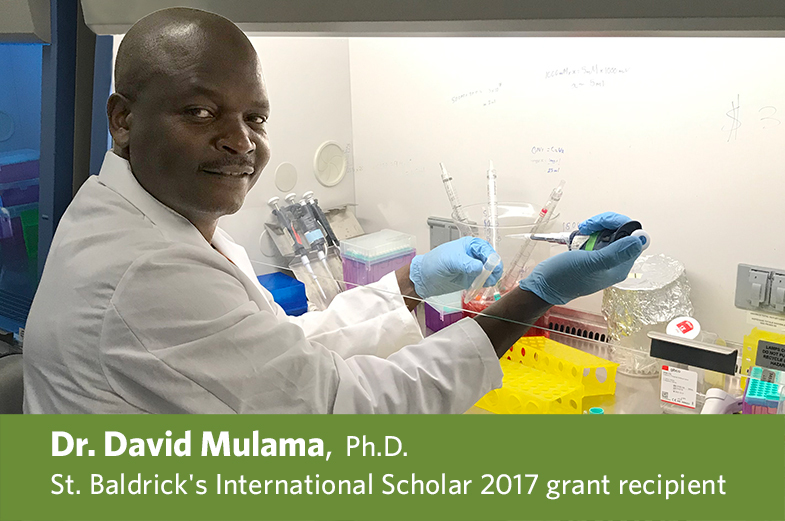On this International Childhood Cancer Day, let’s look at the continent of Africa and, specifically, a cancer researcher who is working to create a vaccine for a particularly frightening kind of cancer.

The deck is stacked against millions of African children. Through no fault of their own — perhaps they were born to HIV-positive mothers, or perhaps they live near a zone where Kaposi sarcoma-associated herpes virus (KSHV) and Human Immunodeficiency Virus (HIV) are common — they are more likely to get a certain kind of cancer called Kaposi sarcoma (KS). Further, sub-Saharan Africa is beset with high endemicity of parasitic diseases like malaria, and a poor medical infrastructure, making the situation dire. Over 40,000 cases of Kaposi sarcoma are diagnosed worldwide, resulting in over 20,000 deaths annually, with the vast majority of those patients in Africa.
If David Mulama, Ph. D. is successful, he’ll help change the odds for those children — through creation of a vaccine and a novel diagnostic test that he is currently working on, together with a team of researchers from Dr. Javier Ogembo’s laboratory at Beckman Research Institute of City of Hope in Duarte, California,
Dr. Mulama received a St. Baldrick’s International Scholar grant in June 2017. Results from this work to develop a vaccine and diagnostic test have so far given him great hope that this can make a tremendous difference in the lives of African children.
Why Fighting Pediatric Cancer in Africa Is So Challenging
In Dr. Mulama’s native Kenya, medical personnel aren’t customarily trained to be cancer-fighters — the situation there is much different than what we are used to here. “Immunosuppression is a real challenge on the continent, and especially in areas around Lake Victoria where HIV, KSHV and parasitic diseases like malaria are quite common. This creates an environment where an oncogenic virus like KSHV causes cancer.”
Exacerbating the problem for Africa: fewer qualified doctors, and those who are qualified are without the right equipment and training for most complex issues. As a result, the focus tends to be less on cancer and more on the immediate needs, such as treating common communicable diseases like malaria or ensuring the health of babies that are born to HIV-positive mothers.
Also, patients can’t readily access the care they need when they need it. “Roads and other means of communication aren’t there, in some cases, so travelling to a medical center can be problematic. Then, once you get there, it’s rare that the medical center has the equipment and medicines needed to fight whatever disease presents itself.”
How Dr. Mulama Hopes to Change the Game
Africa and Mediterranean regions have a KSHV prevalence rate of between 20 to 80%, compared to North America, where the prevalence rates are below 10%. For this reason, a child born in Africa has a 10-fold higher risk of contracting the virus, and possibly the cancer, as opposed to their counterparts in other parts of the world; this is one reason Dr. Mulama’s work is so important to the continent.
According to Dr. Mulama, “Although you can be infected with the virus and live as a healthy asymptomatic individual, a weakened immune system, as occurs in HIV infection or during immunosuppression during organ transplants, heightens the risk for the cancer. You cannot have the cancer without the virus, hence eliminating the cancer will reduce or wipe out this malignancy.
Next Steps for Dr. Mulama
Dr. Mulama considers the International Scholar grant from St. Baldrick’s Foundation a “game-changer and tremendous milestone in the development of my own career as a researcher.”
“We have a long way to go, but the preliminary results from our work look promising” says Dr. Mulama. “No child should die of cancer, especially if it’s something we can treat or prevent.”
With his research, and the work of doctors like him throughout the world — and with the help of St. Baldrick’s Foundation donors and supporters — we can create a world where pediatric cancers like Kaposi sarcoma, and the KHSV virus, are things of the past.
Donate today and we can #DFYtheOdds, together.

Join us today and #DFYchildhoodCancers!
Read more on the St. Baldrick’s blog:

 SBF
Tweets »
SBF
Tweets »